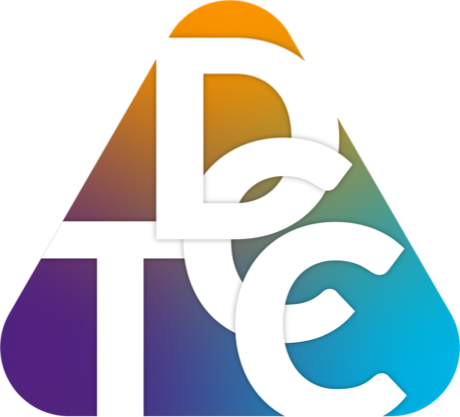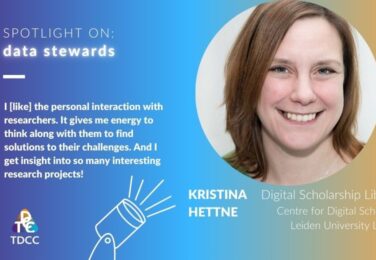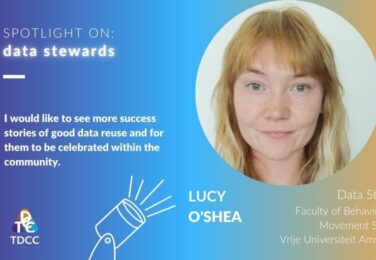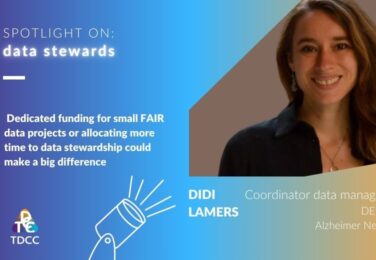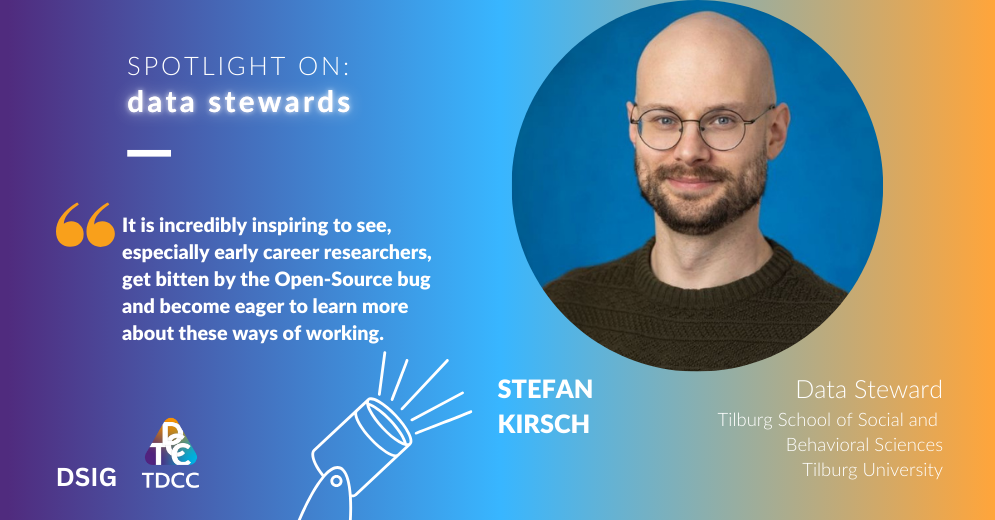
Spotlight on: Stefan Kirsch
Every other week, the Thematic DCCs and the Data Steward Interest Group (DSIG) put the spotlight on one research data steward working in the Netherlands to stimulate knowledge exchange and peer-to-peer learning.
What drew you towards the research data management field?
Research has tremendous potential to shape our society in a beneficial way. But, to ensure quality, research procedures need to be transparent and verifiable. This includes not only Open Access publishing but also an end-to-end accessible research workflow, from ideation to data collection and analysis. While this all seems (and is) like a lot of work for the already overworked average researcher, I strongly believe it is not only possible but also necessary to achieve. Of course, data and software management play a crucial role in this.
What is an activity/task of your role that you find yourself looking forward to?
What I love most is translating community-driven Open-Source software development practices into the academic setting. I think we can learn so much from that culture - which values interdisciplinarity, sharing results, and, of course, openness to suggestions and corrections. It is incredibly inspiring to see, especially early career researchers, get bitten by the Open-Source bug and become eager to learn more about these ways of working. I am very grateful to be involved in a large Open-Source software project now, and I can't wait to see it grow and develop further!
What is something unexpected that you can offer help with, if a colleague reaches out to you?
I always like to think about best practices and how to do things in smarter, more efficient ways. Many researchers don’t have the time for this, so they inadvertently pick up bad habits, often without ever considering whether there’s a better way of doing things. I particularly enjoy those quick, informal Teams calls with researchers, where we share screens back and forth, and I get to teach them a few handy tricks that make their lives easier from then on.
What do you think your community of research data professionals is missing?
I feel that awareness of research software and its role in Open Science is still lacking. After all, if you don’t share how you prepared or analyzed your data, nobody can verify whether your conclusions are valid. I would like to see data professionals embrace basic principles of software management and provide guidance on those as well.
What is a topic you would want to collaborate on with others?
There are, of course, many, but one that comes to mind is integrating AI into research data and software management workflows to provide feedback, spot mistakes, and just do some of the monkey work of Open Science for researchers.
Could you point us to a resource, learning platform, tool or similar which you find useful or inspirational?
An easy one: Tilburg Science Hub
This website is co-created by researchers, student assistants, and support staff at Tilburg University and is full of great articles and tutorials on how to practice Open and efficient Science in the modern age. What distinguishes it from other resources like The Turing Way or The Carpentries is that the articles often cover the bleeding edge of techniques in digital sciences. The platform also doesn’t shy away from providing opinionated guides, allowing for highly detailed, step-by-step instructions on all sorts of topics.
Tilburg Science Hub also has a spinoff called Tilburg.ai, which does everything the main project does but with a strong focus on AI tools.
Sidenote: This is a bit of self-advertisement because I contributed a couple of articles to these websites as well. But feel free to ignore those, and you’ll still get tremendous value out of these resources!
Get in touch with Stefan on Github|ORCID
Do you want to read other interviews published in the Spotlight on series? Visit the series' page.
Are you a data steward or data professional who wants to be featured in one of the future editions? Fill out this form.
